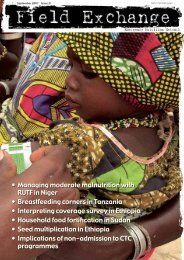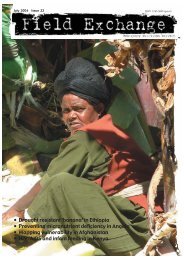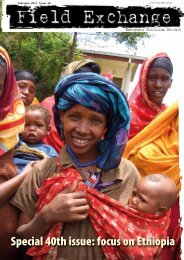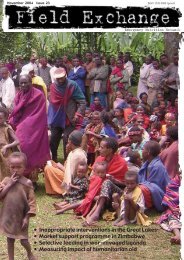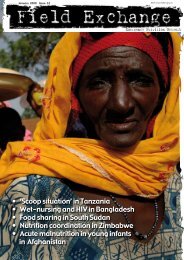Download PDF - Field Exchange - Emergency Nutrition Network
Download PDF - Field Exchange - Emergency Nutrition Network
Download PDF - Field Exchange - Emergency Nutrition Network
Create successful ePaper yourself
Turn your PDF publications into a flip-book with our unique Google optimized e-Paper software.
<strong>Field</strong> Article<br />
Nutriset, Niamey, Mali, 2006<br />
Alejandra Beltran Fernandez<br />
was the Nutriset's Deputy<br />
Project Manager, Social<br />
Marketing for Niger from the<br />
beginning of the research in<br />
2006 to mid 2007.<br />
Isabelle Sauguet is Nutriset's<br />
General Manager.<br />
Florence Da Costa is the<br />
Nutriset's Deputy General<br />
Manager and Marketing<br />
Director.<br />
Virginie Claeyssens is the<br />
Nutriset's Deputy project<br />
Manager, Social Marketing<br />
for Niger.<br />
Participants in the organoleptic study.<br />
Social marketing of a nutritional<br />
supplement in Niger<br />
By Alejandra Beltran Fernandez, Isabelle Sauguet, Florence Da Costa,<br />
Virginie Claeyssens, Adeline Lescanne, Michel Lescanne.<br />
Adeline Lescanne is the<br />
Nutriset's Deputy General<br />
Manager and director of<br />
International<br />
Department.<br />
Michel Lescanne is the<br />
Nutriset's President and Chief<br />
Executive Officer.<br />
This article shares some experiences of the<br />
company, Nutriset, in applying a social<br />
marketing approach to assess the affordability<br />
of a micronutrient supplement for 1-5 year olds<br />
to low income mothers in Niamey, Niger.<br />
This article presents the first results of a<br />
feasibility study (part of ongoing<br />
research) conducted by<br />
Nutriset 1 and its partner<br />
STA 2 , in Niamey, Niger, since<br />
May 2006. Niger was<br />
chosen as the pilot country<br />
since it is one of the poorest<br />
and least developed<br />
countries in the world 3 .<br />
Here, 1,120,000 children<br />
between the ages of 1 and 5<br />
years are at risk of malnutrition<br />
4 and 50,000 of these children<br />
live in Niamey. Moreover, Niger<br />
presented favourable political, economic,<br />
social, technological, environmental and legal<br />
(PESTEL) conditions for setting up the project.<br />
The objective of this study was to determine<br />
if the distribution of a nutritional supplement<br />
for vulnerable low-income populations in<br />
urban Niger was viable. Social marketing techniques<br />
were applied throughout the project to<br />
gather qualitative and quantitative data and to<br />
evaluate the sustainability of such an approach<br />
to prevent malnutrition among at-risk populations.<br />
The nutritional supplement is manufactured<br />
locally by STA. It is hoped that through<br />
local production, nutritional capacity development<br />
will increase. If Nutriset’s social marketing<br />
experience in Niger is positive, the methodology<br />
may be used to develop similar projects<br />
in other developing countries.<br />
Methodology<br />
The research methodology was based on social<br />
marketing techniques 5 , i.e. using commercial<br />
marketing techniques to address social or<br />
public health challenges. According to the literature<br />
6 , there are important differences between<br />
social and commercial marketing approaches.<br />
Commercial marketing seeks to persuade<br />
people to purchase specific goods<br />
or services, whereas social<br />
marketing prioritises and<br />
seeks the well being of individuals<br />
and of society. In<br />
the latter case, needs are<br />
not artificially created.<br />
The research methodology<br />
was validated by marketing<br />
specialists from Ferrero 7 ,<br />
France.<br />
Qualitative and quantitative<br />
questionnaires were administered to mothers<br />
and children in low-income urban neighbourhoods<br />
and in Niamey’s suburban rural<br />
villages. A random sample of 80 people participated<br />
in the questionnaire surveys and a total<br />
of 144 adults and 382 children participated in<br />
the organoleptic tests held in Niamey and one<br />
rural village.<br />
The study comprised four phases, with each<br />
phase lasting 6-8 months. An assessment was<br />
made at the end of each phase before moving<br />
on to the next one. The four were:<br />
Phase 1: Market study and evaluation of need<br />
and feasibility.<br />
Phase 2: Establishing the marketing mix (product,<br />
price, distribution and communication<br />
mechanisms).<br />
Phase 3: Optimising the marketing mix and validation<br />
(this includes industrial production).<br />
Phase 4: Pre-launch in selected areas followed<br />
by the actual launch (this includes the start of a<br />
public information campaign).<br />
The four phase feasibility study started<br />
following authorisation from the Ministry of<br />
Health in Niger.<br />
Main findings influencing the<br />
marketing-mix<br />
The type of product, its price and packaging<br />
were established simultaneously, as the<br />
economic constraints of the target households<br />
allowed for little elasticity. The product chosen<br />
was a ready-to-use micronutrient supplement,<br />
suitable for children between 1 and 5 years of<br />
age. It does not require dilution and can be<br />
eaten at any time of the day. Daily consumption<br />
is set at 5g, which provides a minimum of 50%<br />
of the main recommended vitamins and minerals<br />
for this age group as well as essential fatty<br />
acids, but only a small quantity of energy. It is<br />
therefore not intended to replace a balanced<br />
meal.<br />
The name ‘Grandibien’ was chosen after<br />
interviews with 78 people. ‘Grandibien’ is easy<br />
to understand and emphasises the product's<br />
perceived benefits. Due to the high level of illit-<br />
1<br />
Nutriset is a French company that designs and produces<br />
specialised products for the treatment of different forms of<br />
malnutrition (e.g., Plumpy’nut, Plumpy’doz).<br />
2<br />
STA: Société de Transformation Alimentaire, partner of<br />
Nutriset and member of the Plumpy<strong>Field</strong> network.<br />
3<br />
In 2007, Niger’s rank in the United Nations Human<br />
Development index was 174, out of 177 countries. Source:<br />
http://www.unicef.org<br />
4<br />
A national survey, carried out in October 2007.<br />
5<br />
Kotler P and Zaltman G (1971). Social Marketing: an<br />
approach to planned social change. Journal of Marketing,<br />
volume 35 (July), p. 3-12.<br />
6<br />
Rothschild Michael (1979), Manoff Richard (1985), Kotler<br />
and Roberto (1989), Alcalay and Bell (2000).<br />
7<br />
Ferrero is one of the leaders in the food industry. They<br />
market products for the mass market.<br />
27



